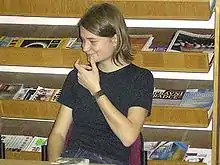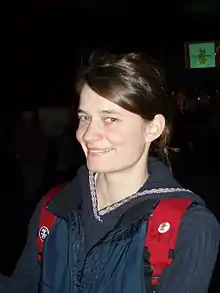Petra Hůlová
Early life and education
Hůlová was born in Prague. She holds a degree in culturology from Charles University in Prague.[1] She lived in Mongolia for one year as an exchange student[2] after having studied the language and culture for several years and having originally had her interest sparked by "a chance encounter with the film Urga by acclaimed director Nikita Mikhalkov."[3]
Career
Hůlová rapidly rose to popularity in 2002 with the publication of her début novel Paměť mojí babičce, which became one of the most widely read Czech books of the decade.[2] The novel is told from the point of view of five female narrators from three generations of the same Mongolian family. She chose to set the novel in Mongolia to avoid the necessity of writing about "artificial phenomena" such as career and media, by which she felt Mongolia had been less "polluted" than Europe; this allowed her to focus on writing about the basic feelings of her characters.[4] The novel won a Magnesia Litera Prize as Discovery of the Year,[5] and was voted Book of the Year by the Czech daily Lidové noviny.
Hůlová's second novel, Přes matný sklo, is set in Prague. The book, divided into three sections, offers a portrait of a relationship between a son (Ondřej) and his mother (unnamed).[6] The first and third sections are narrated by the son; the second, by the mother.
Her stay as a Fulbright scholar in the Department of Anthropology at CUNY in 2004–05 inspired her third novel, Cirkus Les Mémoires, set in New York.[7]
Hůlová's fourth novel, Umělohmotný třípokoj, narrated by a 30-year-old Prague call girl with a high-class clientele,[8] won the Jiří Orten Prize,[9] awarded each year to the author of a work of Czech prose or poetry. The author must be 30 or under at the time the work is finished, and the award carries a prize of 50,000 Kč (roughly $3,000).[10] A stage adaptation by Viktorie Čermáková opened in Prague in 2007. Čermáková chose to attribute the text to five call girls and one narrator.[11]
In 2008, her fifth novel, Stanice Tajga – about a Danish businessman named Hablund who disappears in Siberia after World War II and a man named Erske who, 60 years later, attempts to track him down—received the second annual Josef Škvorecký Award, which carries with it a prize of 250,000 Kč (roughly $14,500).[12][13]
In October 2009, Northwestern University Press published the first translation of her work in English, All This Belongs to Me, a translation by Alex Zucker of her début, Paměť mojí babičce.[14] Zucker's translation of her 2018 dystopian novel Stručně dějiny Hnutí, was published by World Editions in 2021 as The Movement.
Works in Czech
(Translations of titles for informational purposes only.)
- Paměť mojí babičce (2002; "Memory to my Grandmother", in United States published as "All This Belongs To Me")
- Přes matný sklo (2004; "Through frosted Glass")
- Cirkus Les Mémoires (2005; "Circus Les Mémoires")
- Umělohmotný třípokoj (2006; "Plastic Three-bedroom Apartment," in US and UK Published as "Three Plastic Rooms")
- Stanice Tajga (2008; "Taiga Station")
- Strážci občanského dobra (2010; "Guardians of Civil Good")
- Čechy, země zaslíbená (2012; "Bohemia, the promised land")
- Macocha (2014)
- Stručně dějiny Hnutí (2018; "The Movement")
- Zlodějka mýho táty (2019)
Personal life
Hůlová is married and has two children.[15]
References
- "Filozofická fakulta Univerzity Karlovy v Praze (FFUK)". Faculty of Arts, Charles University, Prague. Retrieved 14 April 2011.
- "Petra Hulova: a rising star of the young generation of Czech writers". Czech Radio. 14 January 2007. Retrieved 14 April 2011.
- Allen, Lisette, "Telling a foreign tale in a foreign tongue", Prague Post, 30 September 2009. Retrieved 2011-06-27.
- "Petra Hulova – to Mongolia and back again". Czech Radio. 13 January 2003. Retrieved 14 April 2011.
- "Magnesia Litera Awards announced". Czech Radio. 16 May 2003. Retrieved 14 April 2011.
- Stanislav Škoda (6 October 2004). "Petra Hůlová: Přes matný sklo". Reflex. Retrieved 14 April 2011.
- "Petra Hůlová: Pokaždé píšu od nuly" (in Czech). Týdeník Rozhlas. 6 March 2006. Retrieved 14 April 2011.
- Petr Vaněk (30 November 2006). "Odkrytá tajemství třípokoje". Reflex (in Czech). Retrieved 14 April 2011.
- "Cena Jiřího Ortena" (in Czech). Svaz českých knihkupců a nakladatelů (Association of Czech Booksellers and Publishers). Retrieved 14 April 2011.
- "Cena Jiřího Ortena," Czech Wikipedia.
- The stage adaptation titled Česká pornografie ("Czech pornography") was performed in theatres La Fabrika and Theatre on the Balustrade (on the small stage called Eliad's library). The call girls were performed by Gabriela Míčová, Eva Salzmannová, Lucie Roznětínská, Jindřiška Křivánková and Anna Hrnečková / Miřenka Čechová, the narrator was performed by Zdena Hadrbolcová. Source: theatrical portal i-divadlo.cz, Retrieved 2011-10-29
- "Josef Škvorecký Award goes to Hůlová". Czech News. 6 November 2008. Retrieved 14 April 2011.
- "Cenu Josefa Škvoreckého získala Petra Hůlová" (in Czech). České noviny. 4 November 2008. Archived from the original on 5 August 2009. Retrieved 14 April 2011.
- "All This Belongs to Me". Northwestern University Press. 18 August 2009. Archived from the original on 20 July 2011. Retrieved 14 April 2011.
- Hůlová, Petra, "When my daughter wears the burqa…", Presseurop, 30 December 2010. Retrieved 2011-06-27.
External links
- Blog for All This Belongs to Me
- Excerpt from early draft of All This Belongs to Me in Transcript no. 22 (March 2006)

